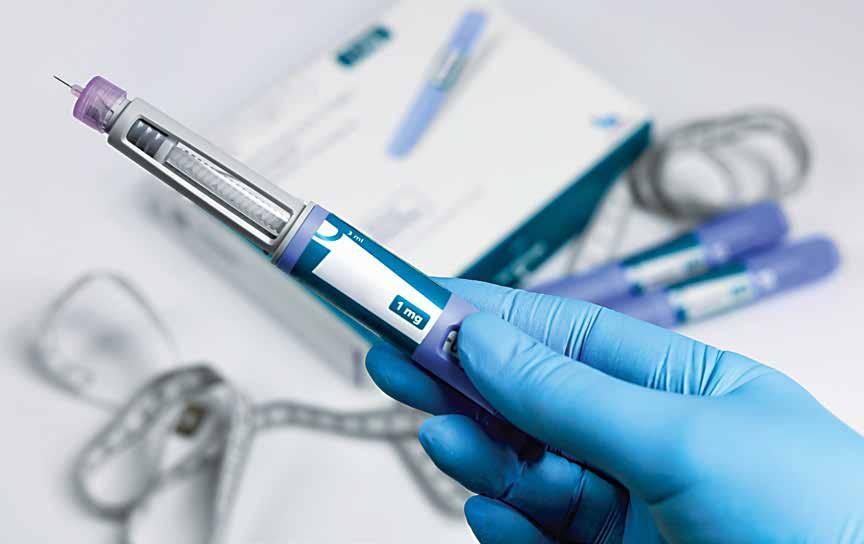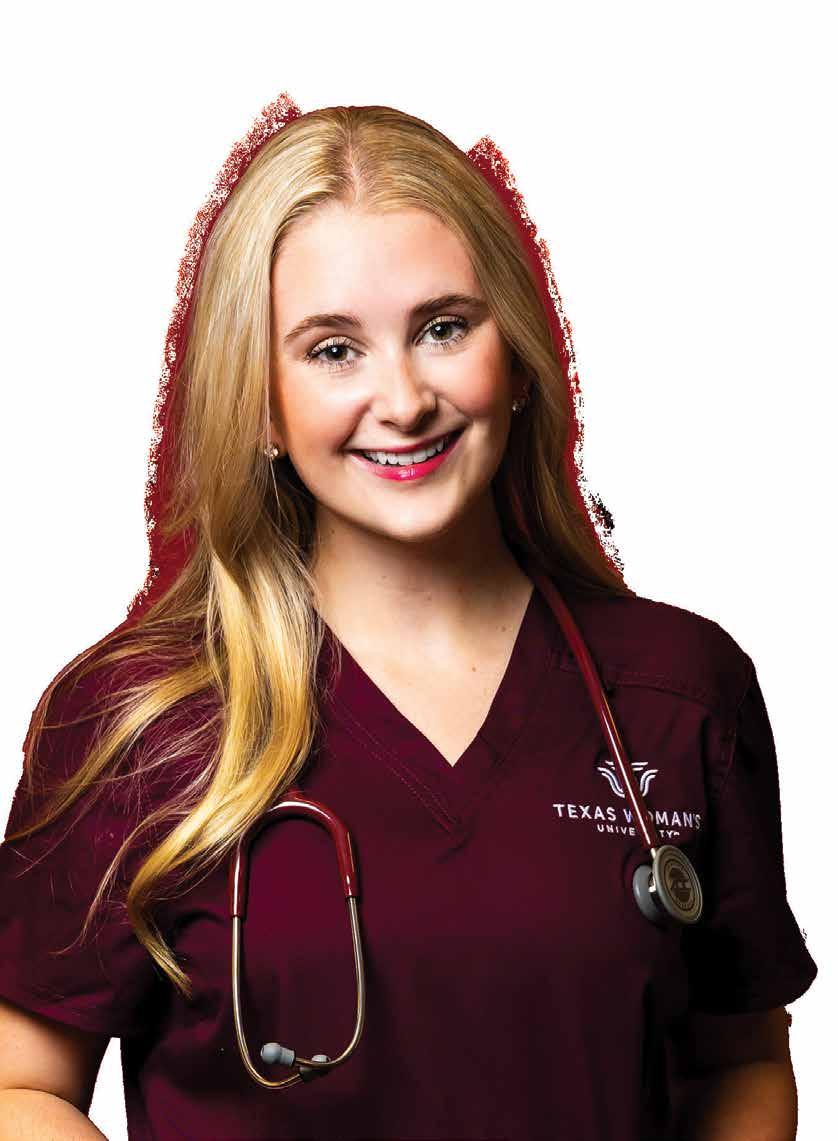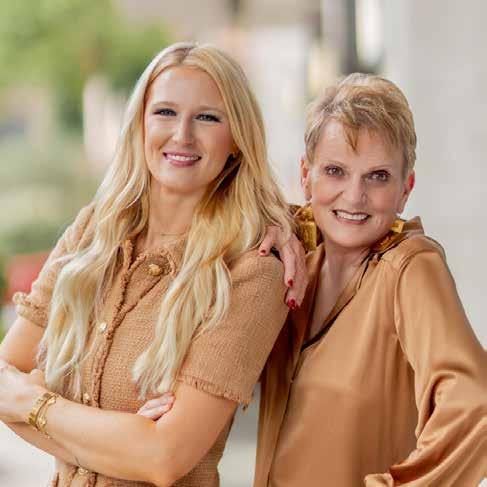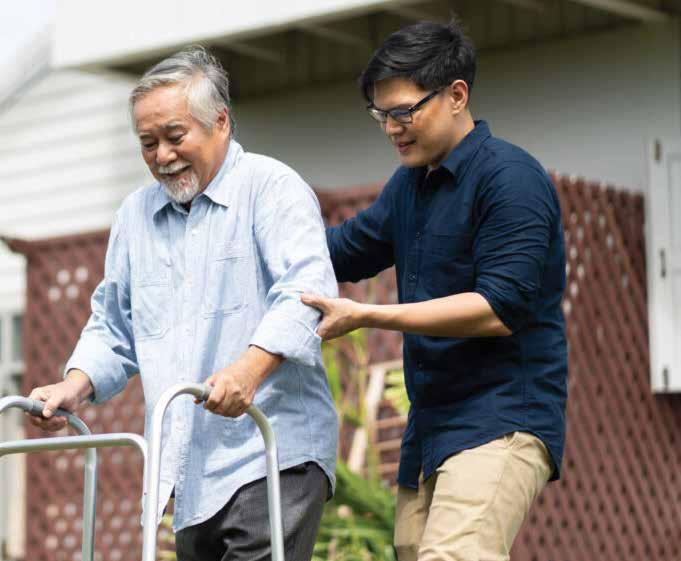HOUSTON

Baylor College Of Medicine Announces Dr. Paul Klotman’s Retirement as President See pg. 9
Oncology Research
Mental Health pg.5
Healthy Heart
Financial Forecast pg.12



Baylor College Of Medicine Announces Dr. Paul Klotman’s Retirement as President See pg. 9
Oncology Research
Mental Health pg.5
Healthy Heart
Financial Forecast pg.12



By Mark S. Armstrong, J.D. Joshua D. McCann, Pharm.D., J.D. Polsinelli, PC
Glucagon-like peptide-1 (“GLP-1”) receptor agonists, such as semaglutide and tirzepatide, have become widely used in recent years to manage type 2 diabetes and to support chronic weight loss efforts. Several forms of these drugs are approved by the federal Food and Drug Administration (“FDA”). The huge popularity of these drugs led to a spike in demand that outpaced the production capabilities of the manufacturers, leading to recent well-publicized shortages of the drugs. The drugs were placed on the FDA Shortage List, which permitted state-licensed pharmacies and FDA-registered outsourcing facilities to produce compounded versions. GLP-1 drugs have since been removed from the FDA Shortage List. Recently, FDA has increasingly warned about unapproved or compounded versions being used by consumers. Although FDA recognizes that a compounded drug may be appropriate if a patient’s medical need cannot be met by an FDA-approved drug, or if an FDA-approved drug is not commercially available, compounded drugs are not FDA approved. FDA recently identified some areas of concern for compounded GLP-1 drugs and is working with its state regulatory partners and compounders to address

these concerns.
Key FDA Concerns
... Some products being offered include agents not approved for human use... which are not FDA approved
1. Safety and Dosing Errors.
a. Compounded GLP-1 products have been linked with multiple adverse events, some serious enough to require hospitalization. These include problems arising from incorrect doses—either patients measuring wrong, healthcare providers miscalculating, doses that are too large, or titration schedules that are more aggressive than those in the approved labels. Common symptoms reported include gastrointestinal distress (nausea, vomiting, diarrhea), abdominal pain, and constipation.
2. Quality, Purity, and Identity Issues.
a. Salt forms: FDA has observed
“salt forms” of semaglutide (e.g. semaglutide acetate or sodium) being used in compounded products. These forms are different from the active ingredient in approved GLP-1 drugs, and the agency does not have data confirming these variants have the same chemical, pharmacologic, or safety characteristics. Importantly, FDA notes that it is unaware of a legal basis to compound using the salt forms.
b. Import sources and active pharmaceutical ingredients (APIs): Many compounded GLP-1 products rely on APIs imported from overseas facilities that have not been inspected or registered with FDA. Some shipments have failed to meet legal or quality requirements. FDA is implementing a “green list” of APIs from manufacturers judged to comply with FDA standards to


CBy Scott Paulson, M.D., Texas Oncology
linical trials are essential for developing new ways to treat, diagnose, and prevent cancer. Every breakthrough in cancer care—from innovative drug therapies to improved radiation techniques—begins with a clinical trial. However, recent research shows that only around 7% of all cancer patients participate in clinical trials, and many people from historically marginalized communities can be hesitant to participate.
Myths About Trial Participation
Contrary to popular belief, clinical trials are not just for patients who have exhausted other options. Many trials are available for newly diagnosed patients, offering access to
new therapies tailored to their specific cancer type—sometimes even down to the molecular level.
Another common belief is that all treatments are tested against a placebo, and there is a chance that participants won’t receive treatment. While that can very rarely happen, most new treatments and techniques in cancer trials are tested against the current gold standard, meaning that all participants will be treated. Placebos comparisons are more common with diseases that do not currently have a treatment.
Some patients are also concerned about having to travel to participate in a trial. At Texas Oncology, we provide trials all across the state, meaning that most participants don’t have to go far from home. However, joining a clinical trial can sometimes mean additional time commitments, such as extra visits and tests to monitor the treatment.
Finally, it won’t cost anything additional to the patient to receive the treatment in the clinical trial,

but patients should discuss with their physician if there may be any other costs that pose a barrier to participation, such as missing work, arranging childor eldercare, or budgeting for food and other necessities.
Benefits of Participation
In addition to accessing new and innovative treatments, potentially with fewer side effects, many patients see improved outcomes, prolonged survival, and enhanced quality of life. All trials follow strict compliance and monitoring guidelines in line with federal, state, and local regulations, meaning that participation is carefully supervised in addition to being fully voluntary.
Considering a clinical trial
also means taking an active role in developing a treatment plan. All trials involve informed consent, meaning that patients must understand what the trial is testing for, how the study compares the test group and control group, and what other alternatives are available to patients. Providers and clinical trial coordinators will also walk patients through any potential risks. For example, the outcomes may be uncertain, the treatment may cause unwanted side effects, or the cancer may continue to progress despite treatment. Any patients interested in
see Oncology. ...page 14


The American Medical Association (AMA) Has Recognized Houston Methodist as a 2025 Joy In Medicine Organization
The recognition from the country’s largest professional association for physicians honors health systems, hospitals, and medical groups that prioritize proven methods to reduce burnout and enhance the professional fulfillment of doctors. Organizations that meet the rigorous criteria of the Joy in Medicine Health System Recognition Program are leaders in transforming health care work systems and addressing the root causes of burnout among care teams.
“This honor affirms Houston Methodist’s role as a national leader in physician well-being and highlights our belief that when physicians and clinicians are supported, our patients and communities receive the very best care,” said Shlomit Schaal, M.D.,
Ph.D., executive vice president and chief physician executive, Houston Methodist.
Burnout among U.S. physicians peaked at 62.8% in 2021 during the COVID-19 pandemic, according to research. But thanks to strides made to address burnout at the system level, the national physician burnout rate ebbed to 45.2% in 2023. Despite improvements, physician burnout levels remain much higher than other U.S. workers.
According to Schaal, Houston Methodist has invested in programs that support a culture of wellness, improve efficiency of practice, and promote personal resilience.
“From seed funding innovative well-being projects, to building peer

support networks, to advancing leadership engagement around physician experience, these efforts demonstrate a holistic approach to clinician well-being,” she said.
Since its inception in 2019, the AMA Joy in Medicine Health System Recognition Program has recognized more than 200 organizations across the country. Recognition levels are valid for two years. This year, a total of 109 health organizations nationwide earned recognition with documented efforts to reduce system-level
drivers of work-related burnout and demonstrated competencies in commitment, assessment, leadership, efficiency of practice environment, teamwork, and support. Organizations that earned 2025-2026 recognition join a strong group of currently recognized organizations from the 2024-2025 program, bringing the currently recognized cohort to 164 recognized organizations.



By Lasha Markham
Whatif “gut feeling” wasn’t just a phrase, but instead held weight in mental health and neurological disorders? Many experts believe so.
Your gut health—specifically, the microbiome within your digestive tract—has been linked to mental health conditions such as anxiety and depression and could even indicate your chances of being diagnosed with Parkinson’s disease later in life.
Narendra Kumar, PhD, an associate professor of pharmaceutical sciences at the Texas A&M University Irma Lerma Rangel College of Pharmacy, has spent over a decade researching conditions that impact the gastrointestinal tract and their implications on the rest of the body. He said the brain must be fueled with the hormone serotonin—and almost 90% of it is produced in the gut. When
serotonin levels get out of balance, it could set off a chain reaction, causing issues like anxiety, depression, digestive problems and other chronic conditions.
“The gut-brain axis controls our mood, cognition and memory, appetite and satiety, and neuron development,” Kumar said. “All of that often leads to better social interactions, which are often compromised in mental health.” From slow digestion to brain disorders
Kumar explained that digestive issues, such as slow digestion in the stomach and small intestine, are common among people with mental health diagnoses because of the serotonin imbalance that characterizes mental health disorders. Research has shown that low serotonin levels in the gut can cause constipation, just as low serotonin the brain can lead to depression.
Notably, chronic constipation
has also been linked to neurological disorders like Parkinson’s disease— sometimes serving as an early warning sign of underlying problems.
“Gut health is a precursor to brain health, and bowel movement can influence body movement,” Kumar said, adding that a healthy gut biome and regular physical activity can support the brain and body in more ways than one.
The search for balance
Because the gut microbiome is as unique as a fingerprint, Kumar said it can be difficult to restore completely once it becomes unbalanced. Probiotic rich foods can help maintain or even build the microbiome somewhat, but he said it’s always best to check with a medical professional and get individual advice based on what your body may be lacking.
He also suggests high fiber and low fat to maintain balance.
“A high fat diet triggers the immune system—and when the immune system is triggered again and again, it causes a condition called chronic low-grade inflammation,” Kumar explained. “When you have chronic low-grade inflammation, it can trigger your insulin system to go out of

whack, and that leads to obesity.”
Persistent inflammation and obesity can eventually lead to type 2 diabetes and related conditions. Obesity has also been linked to mental health conditions, such as depression and anxiety, which can worsen serotonin production and exacerbate existing mental health conditions associated with serotonin deficiency, such as anxiety, depression, insomnia and dementia.
Beyond the immediate effects of poor nutrition, Kumar said diet can also impact long-term brain health. Research suggests that people who consume high amounts of saturated fat over a long period of time may face a higher risk
see Mental Health. ...page 14


For the third time in a row, Larry D. Johnson Heart & Vascular Institute at Memorial Hermann-Texas Medical Center has received the highest rating from the Society of Thoracic
Surgeons (STS) and the American College of Cardiology (ACC) for its patient care and outcomes for the Transcatheter Aortic Valve Replacement (TAVR) program. Among the 403 Transcatheter
UTMB also earns No. 7 spot nationally for Pediatric Hospital Services
UTMB Health has been recognized as a top performer in Vizient’s Bernard A. Birnbaum Quality and Accountability Awards
Valve Therapy (TVT) Registry participants that publicly report worldwide, only 5% of centers that perform TAVR achieve this highest rating.
“Memorial Hermann-TMC was the first and still only hospital in Texas to receive this distinguished rating three times, in 2023, 2024 and 2025,” said Kim Vu, interim associate vice president of hospital operations for Larry D. Johnson Heart & Vascular Institute. “This recognition exemplifies the
for Pediatric Hospital Services, earning the No. 1 rank for Texas and seventh overall in the nation.
The prestigious award highlights the superior performance of UTMB Health for excellence in quality and safety as measured by the Vizient Quality and Accountability Study, which has been conducted annually since 2005.
This year marks the first-ever

commitment of our heart and vascular team to providing the
Hospital News. ...page 13 see UTMB. ...page 13
release of the Pediatric Hospital Services award, making the UTMB Health recognition especially meaningful as it sets a high standard in the very first year of evaluation, and uniquely positions UTMB as the only health system in our region to receive this distinction.





By American Heart Association
For more than 100 years, the American Heart Association has committed to advancing health and hope for everyone, everywhere. Through Houston’s Heart Ball campaign, Dr. Damien and Kelly LaPar, volunteer chairpersons, will lead community-wide efforts to help ensure more Houstonians have the opportunity for a full, healthy life. These efforts include the relentless pursuit of scientific discovery, public policy change, equitable health for the under resourced and underrepresented, and education to equip the community to take control of their health.
“Dr. LaPar demonstrates outstanding leadership and dedication as Chief of Pediatric and Congenital Cardiac Surgery and Executive Co-Director of UTHealth Houston Children’s Heart Institute. Kelly LaPar is Senior Counsel for NRG Energy, Inc. serving the company’s operation and generation needs. Their passion and commitment to the American Heart Association’s mission, deep understanding of community needs, and unwavering drive to make a difference positions them as the perfect choice to chair this event,” says Lacey Berlau, Associate Vice President of Development with the American Heart Association, Houston. “We welcome Dr. and Mrs. LaPar to the Houston Heart Ball, an initiative that centers around better health for every individual by focusing on critical issues and work to equitably improve and save lives.”
Damien J. LaPar, MD, MSc, is Professor and Chief of Pediatric and Congenital Cardiac Surgery and Executive Co-Director of UTHealth Houston Children’s Heart Institute. He also serves as the John P. and Kathrine G. McGovern Distinguished Chair in Cardiovascular Surgery at McGovern Medical School at UTHealth Houston. Dr. LaPar specializes in the surgical repair of the most complex neonatal and infant congenital heart defects, as well as the full range of congenital heart diseases that affect children, adolescents, and adults. He is committed to his patients’ needs, helping them

overcome their most significant and challenging times in life to provide hope for them and their families.
Dr. LaPar trained in congenital heart surgery at Harvard Medical School and Boston Children’s Hospital. He’s a triple board-certified pediatric cardiac surgeon and serves as the director of research and academic affairs for the UTHealth Houston Children’s Heart Institute. His funded congenital heart disease research lab focuses on innovative myocardial reconditioning and restorative therapies. His focused research includes extensive multi-institutional clinical research collaboratives and clinical trials.
Kelly LaPar is Senior Counsel for NRG Energy, Inc. serving the company’s operation and generation needs. In her role as Senior Counsel, Mrs. LaPar brings extensive experience as a construction law practitioner in multiple jurisdictions. Since 2021, Mrs. LaPar has served as an Adjunct Law Professor at the University of Houston Law Center teaching future lawyers the practice of construction law. .
“We are honored to serve as the 2026 Houston Heart Ball Chairs,” said






By Ann Kellett, PHD
Caring for someone with Alzheimer’s disease or another dementia can be overwhelming for informal care partners. Most training programs for family and caregivers focuses on practical knowledge related to medical needs and dementia-related behaviors. But a new approach is gaining traction: teaching care partners problem-solving skills to balance their caregiving role with their own needs.
Now, researchers have new insight into just how much training is needed to yield big results.
“We want the nearly 6 million care partners in the United States
to better cope with and overcome the feelings of stress, depression and isolation that are so common,” said Matthew Lee Smith, PhD, a professor in the Texas A&M University School of Public Health and faculty affiliate with its Center for Community Health and Aging.
To that end, Smith and others on the research team developed an English- and Spanish-language training program that uses a simple A-B-C-D-E-F mnemonic to teach care partners how to break large problems into smaller, more manageable issues and to identify, attain and evaluate goals. The training is delivered via telephone or video conferencing.
Early studies found that both English- and Spanish-speaking care partners who took the training felt less depressed and burdened and were better able to adjust strategies when needed to handle everyday problems.
“The question then became: How much training is enough?” Smith said, adding that while just two to three sessions generated positive results, the researchers did not know how many sessions were best or whether post-intervention booster sessions added value.

To find out, Smith, along with center colleagues Gang Han, PhD, and Chung Lin (Novelle) Kew, PhD, and researchers from TIRR Memorial Hermann, the University of Texas Southwestern Medical Center, Washington University in St. Louis and University of Texas Rio Grande Valley assessed the training using four scenarios: three sessions with or without boosters and six sessions with or without boosters.
Their trial, conducted between June 2021 and July 2023, was funded
by the Texas Alzheimer’s Research and Care Consortium and published in The Lancet Regional Health—Americas.
The researchers worked with 97 English- and Spanish-speaking dementia care partners in Texas, 80 of whom were women. The participants were randomly assigned based on language to three problem-solving training sessions with boosters (19 participants total) or without boosters (21) or to six with boosters (28) or without boosters (29).
All sessions were delivered by see Dementia Care. ...page 13

By Staff
Baylor College of Medicine (BCM) today announced the planned retirement of Dr. Paul Klotman, president, CEO and executive dean, after 15 years of outstanding leadership. The announcement followed the regular meeting of the Board of Trustees and is effective June 30, 2026. The Board also announced the launch of a national search for his replacement.
“Dr. Klotman has done a fantastic job leading BCM. Paul set a clear vision and built an outstanding team to execute it, positioning BCM as a leader in academic medicine. We are very grateful for his many contributions,” said Greg Brenneman, chair of the Board of Trustees. “We planned Paul’s retirement together with him. He has put us in a great position to search for our next leader who we are confident will take BCM to even greater heights.”
Klotman has held the leadership positions since Sept. 1, 2010. He will continue to hold the faculty position of professor after his retirement.
“I have greatly enjoyed my more than 15 years at Baylor College of Medicine,” said Klotman. “Even when times were tough, as they were at the beginning of my tenure, I could count on the outstanding faculty, staff and trainees. The people are the strength of this institution, and they will continue to chart its success.”
Klotman, a nationally recognized leader in academic medicine, said after 48 years in leadership positions – at BCM, Duke University School of Medicine, the National Institutes of Health and the Icahn School of Medicine at Mount Sinai - he welcomes the opportunity to focus on business interests in the future.
The Board has engaged the national recruitment firm of Hodges

Partners, which will begin identifying candidates in a nationwide search over the next several weeks.
As president and CEO, Klotman leads one of the top academic medical institutions in the United States, with net assets close to $3 billion, and outstanding clinical, research and education programs. During his tenure, 50 companies were created with BCM’s intellectual property and BCM raised $1.4 billion through its fundraising efforts.


A premier, four-story medical office building located in the heart of Upper Kirby, offering an array of movein ready suites with free initial test fits.

By Stephanie Taylor Research Specialist III
Financial Exploitation Awareness
Month in October is a time dedicated to protecting older adults from scams, fraud and financial abuse.
The annual observance highlights the growing risk of financial
exploitation among older adults. According to the FBI, Americans 60 and older reported $4.9 billion in losses due to fraud (PDF) in 2024. Texas ranked second nationwide, with losses of $1.4 million in 2024.
Older adults are at a higher risk of exploitation because they often depend on others, said Gustavo
Salinas, Adult Protective Services administrator at the Department of Family Protective Services.
“Financial exploitation is a growing concern that can have devastating consequences, like evictions or an inability to pay for utilities, medical bills or food,” he said.
Salinas said the Adult Protective
Services Financial Exploitation campaign in October will help shed light on the importance of this issue and remind people that, “If it’s not your money, it’s a crime.”
Money Smart for Older Adults offers resources to help older adults and others recognize and prevent financial exploitation. The federal program includes free curriculum with a comprehensive guide, presentation materials and consumer resources focused on identifying scams, avoiding fraud and planning for financial security. If you suspect the financial exploitation of a person 65 or older, report it on the Texas Abuse Hotline website or call 800-252-5400.







By Staff
Memorial Hermann
Hospital has introduced two new furry employees to the team: Stephan and Boris, a golden retriever and lab-golden cross, who are now ready to take to the floor and provide care to pediatric patients as facility dogs.
The facility dog program at Memorial Hermann was founded in 2019. Through their partnership with Canine Companions, the program has now expanded from three to five dogs, increasing access across pediatric units
Katie will oversee the pediatric heart center.
“Stephan and Boris will perform a multitude of tasks to educate and comfort patients,” Rehm said. “This will include mimicking practices such as laying in the CT scanner to demonstrate to patients that procedures are not as scary as they seem.”
The pairs work side-by-side, providing individualized support to their patients. These highly skilled companions take commands from their CCLS handler to help normalize an unfamiliar environment, making

to the medical and emotional support services the dogs and their handlers provide. As puppies, the two spent time with their respective caretakers to develop their skills and temperament. After undergoing extensive training for six months and learning over 40 different commands, they were selected as pediatric facility dogs for Memorial Hermann.
Their handlers, Katie Rehm and Rachel Graves, are Certified Child Life Specialists (CCLS) and were specifically matched to Boris and Stephan based on their personalities and proven success in their respective treatment areas. Boris and Rachel will service the pediatric oncology and outpatient clinics, while Stephan and

them an invaluable addition to the pediatric medical care setting. Their patient, calming demeanors help to foster relationships between patients and care teams and bring positivity to a patient’s day during what can often be a frightening or uncomfortable time.
“With their training and their temperaments, they’re able to connect with patients in ways people can’t always do,” explains Graves. “The impact the dogs are making on our patients has been incredible.”
The Children’s Memorial Hermann team hosted a graduation ceremony for the dogs to honor their impact and officially welcome them to the facility dog team.






By Grace S. Yung, CFP Midtown Financial Group, LLC
Credit and debit card fraud continues to rise as thieves become more sophisticated at capturing personal information. Beyond the financial loss, identity theft can cause headaches such as closing accounts, replacing cards, resetting automatic payments, and monitoring credit for months afterward. Understanding your risks — and taking steps to minimize them — is the first step toward protecting your financial well-being.
Credit vs. Debit: The Safer Choice
When possible, use credit cards
Physical Protection
Card skimming still happens at gas pumps, ATMs, and point-of-sale terminals. Inspect the card reader for tampering before swiping or inserting your card. Shield the keypad when entering your PIN and keep your card in view during transactions. If you carry contactless cards, consider using an RFID-blocking wallet or sleeve to prevent unauthorized wireless scanning.
Digital Protection
Fraud also occurs online — so develop strong cyber habits:
• Use strong, unique passwords and consider a password manager.
• Enable two-factor authentication (2FA) on your card and banking apps.
• Avoid entering payment details while on public Wi-Fi.

instead of debit cards. Credit cards generally provide stronger consumer protections under federal law. Your liability for unauthorized credit card charges is capped at $50 — and many issuers offer zero-liability policies, leaving you with no loss at all.
Debit card fraud can be much more disruptive, since money is withdrawn directly from your checking account. Even if your bank restores the funds, it can take time, potentially causing overdrafts or missed bill payments.
Best Practice: Use credit cards for both in-store and online purchases. Reserve debit cards for ATM withdrawals or situations where a credit card cannot be used.
Physical & Digital Safeguards
• Take advantage of virtual card numbers or merchant-specific card numbers for online purchases when available.
• Stay alert for phishing scams — go directly to your card issuer’s official website rather than clicking on email links.
Monitoring & Freezing Your Credit
Even careful consumers can be caught in large-scale data breaches. Proactive credit monitoring can alert you quickly to suspicious activity such as new account openings. For additional protection, consider placing a fraud alert or credit freeze with the three major credit bureaus.
A credit freeze is one of the most
Continued from page 6
highest quality care to patients every single day.”
The STS and ACC star-rating system is considered one of the most highly regarded measures of
Continued from page 6
“To be named the No. 1 Pediatric Hospital Service in Texas is a profound honor,” said Dr. Jochen Reiser, UTMB President and CEO of the UTMB Health System. “This achievement is not just a ranking—it’s a promise fulfilled to every child and family who
Continued from page 7
Dr. Damien and Mrs. LaPar. “Heart disease is not a unique or selective condition to any one population. It is ubiquitous. Impacting millions in every segment of our communities, both acquired and congenital heart disease must be recognized as a health care
Continued from page 8
telephone or video conference by professional coaches with backgrounds in social work or counseling. In the regular sessions, held every week or so, participants learned how to gather information about their problems, generate and evaluate potential solutions, create an action plan and evaluate and revise plans as needed.
Continued from page 12
powerful tools available — it blocks new credit inquiries until you lift it, which prevents criminals from opening accounts in your name. Freezes can be temporarily lifted when you need to apply for credit and are available free of charge.
Insurance & Protections
quality health care in the country. Memorial Hermann-TMC received a 3-star rating, the highest possible.
The team of affiliated doctors and nurses at Memorial Hermann-TMC was among the first in Texas to perform a commercial TAVR procedure in 2011 and now, 14 years later, the team of doctors,
entrusts us with their care. It affirms that UTMB is leading the way in pediatric excellence, compassion, and innovation.”
The Vizient study helps participating hospitals and health systems understand their performance against their peers related to patient care activity. The recognition period is for work spanning July 1, 2024, through June 30, 2025, and—for pediatric hospital services—focused
emergency. We are eager to work with our outstanding team of volunteers and the American Heart Association to drive change by removing barriers to health, investing in groundbreaking research, delivering impactful health education and advocating for healthy policies. It takes a village to make a lasting impact, and we must do whatever it takes to create a better tomorrow for
They also practiced applying the strategy to the goals or problems they identified, taking on more responsibility for this as the sessions progressed. All participants received the same training, but those in the six-session version had more time for practicing.
Booster sessions were shorter than the full sessions and were held monthly for six months after completion of the regular program. In these sessions, participants could develop and practice strategies and further discuss the
Most major card networks provide zero-liability protection for unauthorized charges, but it is still wise to review your cardholder agreement so you know the reporting requirements.
You may also want to explore identity theft insurance, which can help cover costs such as lost wages, legal fees, and document replacement if you need to restore your identity. Some homeowners or renters insurance policies offer low-cost riders that include this coverage, and some employers provide identity theft protection as a
nurses and staff continue to be at the forefront of the TAVR procedure, achieving industry-leading patient outcomes.
TAVR is a minimally invasive procedure to replace the aortic valve in patients with severe aortic stenosis, which can cause chest pain, shortness of breath and fatigue
on four domains: mortality, patient safety, efficiency (length of stay), and effectiveness (readmissions).
“Being recognized as a Top Performer is a testament to the heart, skill and unwavering dedication of our pediatric teams,” said UTMB Senior Vice President and Chief Medical and Clinical Innovation Officer Dr. Gulshan Sharma. “Every child we care for inspires us to raise the bar, and this honor affirms that UTMB is a place
all people in Houston.”
The 2026 Houston Heart Ball will be held on Saturday, February 7, 2026, at The Hilton Americas Houston. The annual event is a night to celebrate the Association’s year-round efforts to break down barriers to health in Houston. For more information on how to support or attend the Houston Heart Ball, visit www.Heart.org/HoustonHeartBall or
training and possible applications with the coach.
The researchers measured participants’ depressive symptoms and level of caregiver burden before the training sessions began and after each session and booster.
“We found that both mood and problem-solving ability improved very quickly—in as few as three sessions without boosters,” Smith said. “In addition, this improvement continued with additional time and support.”
workplace benefit.
Leverage New Technology
Take advantage of technology that works in your favor. Digital wallets such as Apple Pay, Google Wallet, and Samsung Pay use tokenization, which replaces your actual card number with a single-use code. Many issuers also offer real-time purchase alerts and geolocation matching to help you spot fraudulent charges immediately. The Bottom Line Identity theft can’t be completely eliminated, but you can dramatically
due to limited blood flow. Patients who have the TAVR procedure often spend just one day in the hospital and experience a quicker recovery than with traditional heart surgery.
where excellence in pediatric care is not just a goal—it’s a standard.”
Driven by a system-wide commitment to improving patient outcomes, UTMB launched its Best Care initiative aimed at delivering consistent, high-quality care to every patient, every time. And years of focused effort across departments have led to measurable improvements, culminating in national recognition.
contact Lacey Berlau (Lacey.Berlau@ heart.org).
He said the team intends to further refine the training so care partners could apply it to any of the complex and often overlapping physical, psychological, social and financial stressors associated with caregiving.
“Our goal is to develop a comprehensive program that gives care partners simple strategies for dealing with any of those stressors at any time, and for changing strategies as the situation changes, even from moment to moment,” Smith said.
reduce your risk — and lessen the inconvenience if fraud occurs. By using credit cards instead of debit cards, practicing safe habits online and in person, monitoring your credit, and leveraging issuer protections, you can stay one step ahead of fraudsters.
Work With a CFP Professional A Certified Financial Planner professional can help you evaluate your risk exposure, recommend appropriate safeguards, and integrate fraud protection into your overall financial plan.
Continued from page 1
help guard against dangerous or substandard imported materials.
3. Regulatory Gaps and Enforcement Challenges.
a. Because compounded drugs are not FDA-approved, they are not subject to the same pre-market evaluation of safety and efficacy. That means there is less assurance of consistent dosage, purity, sterility, or labeling practices.
b. Reporting of adverse events for compounded drugs is less complete.
As of July 31, 2025, FDA received 605 reports of adverse events associated with compounded semaglutide. However, because state-licensed pharmacies are not legally obligated to submit adverse event reports to FDA, the total number of adverse events may be underreported.
4. Experimental, Unapproved, and Counterfeit Products.
a. Some products being offered include agents not approved for human use, including retatrutide
Continued from page 3
participating should talk to their oncologist. (Read “Three Questions to Ask Your Oncologist About Clinical Trials.”) All trials have specific eligibility requirements, which are as inclusive as possible in order to better understand
Continued from page 5
of developing Alzheimer’s disease than those who eat a more balanced diet.
In addition to what you eat, an active and social lifestyle also plays a role in brain and gut health. Physical activity is widely recommended to treat chronic constipation because it can help speed up the time it takes food to move through the large intestine. Exercise and social activity also both increase serotonin production, which can improve digestion.
To combine exercise with social interaction, Kumar suggests joining a local running group or gym exercise classes.
and cagrilintide, which are not FDA approved and are not components of any FDA-approved drug.
b. FDA is aware of counterfeit Ozempic marketed in the U.S. Counterfeit drugs claim to be authentic, but could contain the wrong ingredients, contain too little, too much or no active ingredient at all or other harmful ingredients, and are illegal.
c. Note that counterfeit drugs are different than compounded drugs. Counterfeit drugs claim to be authentic and likely are labeled to appears to be the commercially available product. The labeling of a legally compounded drug will indicate that it is a compounded drug product.
What Patients and Providers Should Know
• Patients should obtain prescriptions for GLP-1 medications from licensed practitioners, and fill those prescriptions at state-licensed pharmacies. Avoid obtaining prescriptions from unknown online sources.
• Talk openly with healthcare
how treatment works for different ages, genders, health conditions, ethnicities, and lifestyles. A patient’s medical history, stage of cancer, and previous treatments will all be considered before enrolling them in the trial.
Ultimately, clinical trial participation can benefit both the patient and the field of cancer research. Every patient who participates in a
providers about drug dosing, schedules, and any side effects.
• Check that labels and packaging are legitimate and avoid products sold without clear regulatory oversight or falsely labeled as “For Research Purposes” or “Not for Human Consumption.”
Conclusion
GLP-1 receptor agonists have made a dramatic impact in treating obesity and type 2 diabetes when used under proper medical supervision. However, unapproved or compounded versions carry risks ranging from dosing errors to impurities and unproven formulations. FDA is increasing its regulatory oversight through import alerts, enforcement letters, and public advisories to protect consumers from unsafe versions of these drugs. For safety and effectiveness, individuals should rely on approved products prescribed by licensed healthcare professionals or compounded drugs prepared by a licensed pharmacy if the patient’s medical need cannot be met by an FDA-approved drug.
clinical trial is helping all the cancer patients that come after them.
To learn more about participating in a clinical trial and the innovative research taking place at Texas Oncology locations across the state, visit TexasOncology.com/clinical-trials.

Scan to Visit
“We’re big fans of Facebook these days. Everybody is linked up virtually, but use Facebook to your advantage,” Kumar said. “Make a group and say, ‘Let’s meet at 5 a.m. and go for a 5k,’ and give a meeting place. Use it as a tool and don’t rely on meeting virtually solely for social interaction.”
A two-way street between gut and mind
Kumar said the connection between the gut and brain goes both ways. A healthy lifestyle can strengthen both mental health and digestion, helping protect against disease and lowering the risk of mental illness.
When you eat nutritious foods and stay active, you nourish your gut microbiome and improve digestion, which leads to the release of signals that can boost mood and reduce anxiety. When anxiety is reduced and mental health is strong, there is less risk of disrupting gut function, leading to more comfortable digestion and improved nutrition absorption, further fueling your brain. Taking care of one system takes care of another and better serves the whole body, illustrating the powerful, two-way connection that bolsters overall well-being.
Houston Medical Times is Published by Texas Healthcare Media Group, Inc. All content in this publication is copyrighted by Texas Healthcare Media Group, and should not be reproduced in part or at whole without written consent from the Editor. Houston Medical Times reserves the right to edit all submissions and assumes no responsibility for solicited or unsolicited manuscripts. All submissions sent to Houston Medical Times are considered property and are to distribute for publication and copyright purposes. Houston Medical Times is published every month
P.O. Box 57430 Webster, TX 77598-7430





